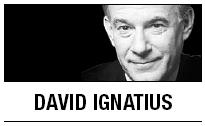WASHINGTON ― Tom Donilon, President Obama’s national security adviser, has a reputation as a “process guy,” meaning that he runs an orderly decision-making system at the National Security Council, and as a “political guy” with a feel for Capitol Hill and the media.

Now, facing the rolling crisis of the Arab Spring, Donilon has had to transform himself into the ultimate “policy guy” ― coordinating administration strategy for a revolution that will alter the foreign-policy map for decades.
U.S. strategy is still a work in progress. That’s the consensus among some leading Donilon-watchers inside and outside the government. The national security adviser has tried to shape Obama’s intuitive support for the Arab revolutionaries into a coherent line. But as the crisis has unfolded, there has been tension between American interests and values, and a communications-oriented NSC staff has sometimes seemed to oscillate between the two.
“The focus is more on how it plays than on what to do,” says one longtime friend of Donilon. He credits Donilon as “a very smart political person” who has brought order to the planning process. But he cautions: “Tom is not a strategist. He’s a pol. That’s the heart of what he is and does.”
Another member of the inner circle similarly credits Donilon as “very inclusive of all the principals in the decision-making process.” But he worries that this White House is too focused on “message management.”
The uprisings in Egypt, Bahrain, Libya, Yemen and now Syria all embody the tension between U.S. interests and values, and Obama has leaned different ways. With Egypt and Libya, the White House voted its values and supported rebellion and change; with Bahrain and Yemen, the administration, while sympathetic to reform, has embraced its interests in the stability of Saudi Arabia, Bahrain’s neighbor, and in a Yemen that is an ally against al-Qaeda.
The mix is pragmatic, which seems to suit both Obama and Donilon. Yet it sometimes frustrates ideologues on both sides who want a more systematic line. My instinct is that the White House is right to be pragmatic, and for that reason should avoid making so many public pronouncements: This is an evolving crisis, each country presents a different set of issues; a one-size-fits-all policy approach would be a mistake.
The biggest test may come in Syria, where President Bashar al-Assad has launched a ruthless crackdown. Here, U.S. values and interests would seem to coincide in the fall of Assad, who is Iran’s key Arab ally and maintains a repressive, anti-American regime. But there are dangers: Assad’s fall could bring a sectarian bloodbath. So far, Donilon seems to be holding a middle ground to allow maximum U.S. flexibility.
In an interview in his West Wing office last week, Donilon outlined his basic strategic framework. It begins with Obama’s intuitive feel for these issues. Back in January when the Arab revolts began, Obama admonished his NSC advisers, preoccupied with other issues: “You need to get on this!”
Donilon cites four guidelines that have shaped the administration’s response ever since: First, the Arab revolt is a “historic” event, comparable to the fall of the Ottoman Empire or the post-1945 decolonization of the Middle East; second, “no country is immune” from change; third, the revolution has “deep roots” in poor governance, demographics and new communications technology; and fourth, “these are indigenous events” that can’t be dictated by America, Iran or any other outside power.
Donilon also stresses that this process of change is just beginning. “We’re in the early chapters,” he says, warning that the U.S. should be careful not to take actions now that it might regret down the road, as situations change and new players emerge.
A useful reality-check for Donilon was his trip earlier this month to Saudi Arabia, which had been traumatized by Obama’s abandonment of deposed Egyptian President Hosni Mubarak and America’s initial support for Bahrain’s Shiite protesters. Donilon met with Saudi King Abdullah for over two hours and gave him a personal letter from Obama. The reassuring message, he says, was about “the bond we have in a relationship of 70 years that’s rooted in shared strategic interest.”
Donilon is preoccupied now by Syria. He doesn’t want to talk details of policy but says the administration will follow its basic principles of opposing violent repression and supporting reform. He says Assad made a disastrous mistake being “constipated” about change. As for a Libya-style intervention, Donilon seems dubious that a military option in Syria is available or advisable.
By David Ignatius
David Ignatius’ email address is davidignatius@washpost.com ― Ed.
(Washington Post Writers Group)







![[Today’s K-pop] Blackpink’s Jennie, Lisa invited to Coachella as solo acts](http://res.heraldm.com/phpwas/restmb_idxmake.php?idx=644&simg=/content/image/2024/11/21/20241121050099_0.jpg)
